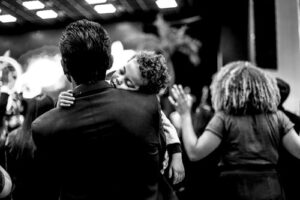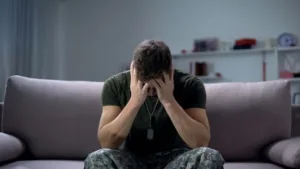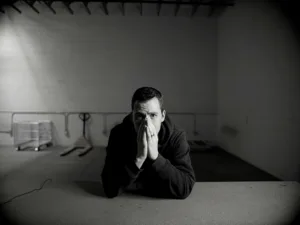Fathers have an important impact on their children. Your relationship with your father substantially affects who you are and what you do as an adult man. Learn how abusive fathers affect the mental health and well-being of boys and men.
According to the nonprofit research group Zero to Three, children with loving and involved fathers tend to have higher IQs, better language and cognitive skills, and an easier time managing emotions. These benefits extend into adulthood.
On the opposite end of the spectrum, men who grew up with abusive, negligent or emotionally distant fathers are at higher risk of developing depression as well as other mental health issues. Living with an abusive man can exacerbate these issues, making it crucial to address and heal from such trauma.
If you had a healthy father-son relationship growing up, you were given a substantial gift and even a leg up emotionally. If you didn’t, you may have some work in front of you, but it is entirely possible to heal the wounds inflicted by your father and emerge as the man you know you can be.
In this blog post, we’ll discuss some of the adverse side effects common to men who grew up with abusive fathers, how to cope with these trauma responses and how you can begin to heal.
“The fact that you are reading this blog is a step in the right direction. The first step is acknowledging the abuse,” says Stephen Rodgers, LCSW, founder of Denver Men’s Therapy.
A note before you begin: This is a highly sensitive topic. If this blog becomes too uncomfortable for you, it’s OK to take a break and come back later — or skip this one altogether. You can always reach out to us for support.
You Are More Than Your Trauma
There are three crucial things to keep in mind as we explore the effect abusive fathers can have on their adult sons:
-
There is no “normal.” You may experience circumstances that are similar to those of other men — even siblings — and respond completely differently. This is because we are all unique individuals who process experiences through our own lenses and are influenced by our family dynamic.
-
You are not to blame. The abuse you experienced or witnessed as a boy is not your fault and will never be your fault. There is nothing you could have done to prevent it. It is the sole responsibility of your abuser.
-
You are not destined to become your father. You may come from a long line of abusive men, but this does not mean that you will somehow automatically become an abusive father yourself.
“My guess is that your father and grandfather never thought of taking steps toward ending their pain and the abuse they were causing,” Rodgers says. “You have started to acknowledge your own trauma and are taking the first steps to address it. In doing so, you are ending generational trauma. This is a gift you are giving to yourself and those that come after you.”
Understanding the Impact of Emotional Abuse
Emotional abuse can have a profound impact on a person’s mental health and well-being. It often leads to feelings of low self-esteem, anxiety, and depression, making it challenging to navigate daily life. Emotional abuse can also severely affect a person’s ability to form and maintain healthy relationships. Children who experience emotional abuse may struggle with emotional regulation, leading to difficulties in managing their emotions and behaviors.
The repercussions of emotional abuse are not limited to mental health. It can also manifest in physical health problems, such as headaches, stomachaches, and sleep disturbances. Recognizing the signs of emotional abuse, which can include verbal aggression, belittling, and humiliation, is crucial. Emotional abuse can be just as damaging as physical abuse, and it’s essential to seek help and support if you or someone you know is experiencing it.
Abuse survivors can benefit immensely from therapy, support groups, and emotional support from loved ones. These resources can provide the necessary tools to rebuild self-esteem, manage anxiety, and foster healthy relationships. Remember, acknowledging the abuse and seeking help is a courageous step toward healing.
Common Negative Side Effects
While each person’s story, journey and experience are unique, there are some common themes we see when looking at men who grew up with fathers who committed child abuse. Here, we are discussing child maltreatment in broad terms that encompass emotional, psychological, physical and sexual abuse.
-
Low self-esteem and self-worth. Child abuse can distort your sense of self, making it extremely hard to know, trust or like yourself.
-
Difficulty forming healthy relationships. You may find it extremely difficult to form secure attachments with others, even a spouse. This can lead to issues with intimacy and trust.
-
Aggressive behavior. The abusive father often models anger. Boys may also be ridiculed, punished or physically abused for crying or expressing emotions other than anger. This can lead to a pattern of aggression later in life.
-
Difficulty expressing emotions. Men who have been abused may find it difficult to express emotions or name how they are feeling.
-
Mental health issues. You may be at increased risk of developing depression or other mental health issues.
-
Physical and social consequences. According to the CDC, children who go through adverse childhood experiences (ACEs) “may have unstable work histories as adults and struggle with health issues, finances, jobs and depression throughout life. These effects can also be passed on to their own children.”
The level and degree to which these symptoms present will vary. While some men with abusive fathers develop PTSD or complex PTSD (PTSD-C), others don’t but “are still very hard on themselves to ‘never be like dad,’” Rodgers says. “This results in a very black-and-white approach to being a dad, feeling like they can’t make mistakes or have to be perfect. This ends up being a setup because no one, particularly us parents, is perfect.”
The Role of the Father in Shaping Mental Health
A person’s own father can play a significant role in shaping their mental health. Fathers who are emotionally abusive, neglectful, or physically abusive can leave lasting scars on their children’s mental well-being. Children who grow up with abusive fathers may develop anxiety, depression, and post-traumatic stress disorder (PTSD). They may also struggle with self-esteem, emotional regulation, and forming healthy relationships.
Conversely, fathers who are loving, supportive, and involved can have a profoundly positive impact on their children’s mental health. They provide emotional support, guidance, and a sense of security, which are essential for children to develop into healthy and happy adults. It’s crucial for fathers to be aware of their behavior and its impact on their children’s mental health. By fostering a nurturing environment, fathers can help their children build a strong foundation for emotional well-being.
Healing From an Abusive Father: How to Begin
Healing from the trauma of an abusive father’s behavior is a process that requires time, support, and often professional guidance. Here, Rodgers offers some steps and strategies that can aid in the healing process for men who have experienced any form of abuse:
1. Acknowledge and Accept
The first step toward healing is acknowledging the verbal abuse and its impact on your life. Accepting that what happened was not your fault and that seeking help is OK can be empowering and liberating.
2. Seek Professional Help for Mental Health
Psychotherapy, particularly trauma-informed therapy, can be incredibly beneficial. Therapies like group therapy, Eye Movement Desensitization and Reprocessing (EMDR) and trauma-focused therapy can help individuals process their experiences, develop coping mechanisms, and work through the emotional pain associated with their trauma. Involving trusted family members in the healing process can also provide additional support and help mitigate the effects of abuse.
3. Build a Support Network
Surrounding yourself with supportive friends and family or joining a support group for abuse survivors can provide a sense of community and understanding. These networks can offer emotional support, advice and a space to share experiences with others who have faced similar challenges, such as when Dianna’s father called her demeaning names, highlighting the importance of recognizing and addressing verbal abuse.
4. Develop Healthy Coping Strategies and Healthy Relationships
Identifying and practicing healthy coping mechanisms can significantly impact healing. This might include physical activity, mindfulness practices like meditation or yoga, engaging in hobbies or activities that bring joy, and practicing self-care to improve physical and mental health.
Important note: There are adaptive coping and maladaptive coping strategies. Examples of adaptive coping mechanisms are mindfulness or breath work, connecting to nature or support systems. Maladaptive coping for men can often take the form of externalizing, anger, acting out, attempting to control or substance abuse.
“I often hear from my clients, ‘As a kid, it was the only thing I knew,’ or ‘It is what it is,’” Rodgers says.
The urge or impulse to downplay the abuse you suffered at the hands of your father is natural. No one wants to feel like a victim. But, acknowledging what happened and recognizing that, while you did not have a choice in the abuse, you do have a choice in how you move forward is empowering and courageous.
“This work is difficult,” Rodgers says. “There are no tips and quick tricks to resolve it. But with hard work, you can heal.“














